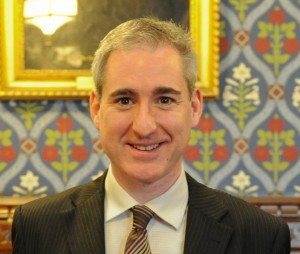“Avoid using the ‘industry’ word in the pub — Greg Mulholland MP
Having addressed the Oireachtas Joint Committee on Jobs, Enterprise and Innovation at the end of June Liberal MP Greg Mulholland has been busy back in the UK. It took me three attempts to pin the Founder of the UK’s ‘Save the Pub’ All-Party Parliamentary Group down to an interview.
Such developments as the UK Government’s recent publishing of its draft proposals on Market Rent Only legislation for pub tenancies there keep him on his toes.
“At present the main focus is back on the pub company issue which obviously doesn’t apply in Ireland,” he says.
But there are some issues which do.
Business tax & rates reductions
“We haven’t had a revaluation of business rates here for some time,” he tells me, “Ironically, partly because of the engineering that went on around the pub company model, business rates on pubs as calculated are not the same as on other forms of business. Many pubs face business rates that are not sustainable so we’re pushing hard to try and get a formula on which pubs could be more fairly rated.”
His APP Group is also trying to get a reduction in VAT for the UK hospitality sector.
“Unlike Ireland, it hasn’t happened here and there doesn’t seem to be a great appetite for this with the Government being fixated on beer duty,” he says.
“Our argument is that beer duty’s certainly too high but if all we do is keep cutting beer duty we’re only really helping brewers and not pubs.
“So we’re looking for a way to achieve positive tax rates for pubs. For example we’re exploring using the Pubs, People & Places report from the Institute of Public Policy & Research to argue that business relief should be given to pubs that can show community importance – being hubs for holding community meetings and other social gatherings – and so give pubs with genuine community value community ratings.”
Getting Irish politicians onside
What’s notably different between the UK and Ireland is that UK politicians can demonstrate that they care about the future of the pub as part of the community without being stigmatised. Here, such politicians seem not to exist.
“I’ve become well aware of this since I visited Ireland last time,” he agrees, “It’s certainly quite difficult.
“First of all we’ve a real affinity here with the English pub as a historic institution. Everyone can picture the English pub – even stereotypically – it’s not just a bar or a place for selling drink.
“Because of the positioning of the English pub, it’s certainly easier to get that identity across to politicians here and to get them to say ‘We support The Pub’.
“I’d suggest trying to build the discussion around the reputation of Irish pubs as that community hub – that’s a key phrase.
“Emphasise that these are places where people meet, where community groups go, where communities come together, where generations of families can pop in as adults. Neighbours can meet there. It’s especially true of rural areas which are facing a particular threat at the moment.
“It’s about getting away from the idea that it’s just about retailing alcohol,” he continues, “The pub’s contribution to the community is the thing to focus on and start to build on that by putting together the evidence.”
He suggests commissioning something like the UK Pubs, People & Places report from the Institute of Public Policy & Research here in Ireland.
“Perhaps emphasise ‘Pubs as focal point of community’ using this research,” he suggests.
A second way of combating the Irish politician’s reluctance to get involved is through the tourist angle.
“What do tourists to England want to see? The English pub… “The irony is that there are Irish pubs in nearly every city in the world, so it’s of considerable economic benefit as well as being of benefit to the community.”
Citing the award-winning Guinness Storehouse he observes, “Essentially, the Guinness Storehouse glorifies and celebrates a factory that makes alcoholic product, yet a family-run pub business operates seven days a week and should be celebrated in the same way.
“We’ve pushed this over here and have even been successful with the likes of Alcohol Concern who say that they see pubs as the place to drink alcohol rather than supermarkets or at home as it’s about being sociable and not just about drinking; it’s also supervised.
“So it’s not about people getting drunk in pubs because people with a drink problem will buy spirits and drink it at home.”
What’s next for APPG
Nevertheless, pub sales are recovering in Ireland with figures indicating an increase in value and volume for the first half of the year.
In contrast, the number of English pubs continues to decline and while there’s more sympathy for them there I wonder if his campaign will significantly counter these ongoing trends of decline in the number of pubs in England?
“It has to,” he responds, “As society evolves and changes, the way people will use the pub will change too and we have to expect that. We need to see what the pub has to do to survive.
“Yesterday’s shops are very little like the shops of today.
“How rural pubs in Ireland can survive is by being the hub of the community by adding extra services, shops, a post office, all other things that will keep them in business.
“Get in touch with Pub is the Hub in England and see what they’ve done,” he suggests.
With time pressing he summarises the prospective routes forward for the Irish on-trade as he sees the paralells.
“Urban pubs in the UK are different from the English country local,” he says, “Focus on the all-round experience, making sure that it’s about the community pub and not just about drink.
“One of the things people often think of when they think of an Irish pub is the music; people want to go and listen to this music. That’s a bigger thing in Ireland than it is in the UK although music in pubs here is important enough too.
“What are very much the perceptions of people outside Ireland when they think of an Irish pub are the friendly staff, a real welcome (more so than perhaps some of the larger volume pubs) and that there will be locals there as well as visitors – that’s part of it being a community pub.
“Many of these pubs have now gone in our cities here. That’s a big thing for us.”
Avoid ‘industry’ tag
And he has one final important piece of advice: “In getting solid evidence on the economic benefit of the pub don’t talk about the industry. Don’t talk about the ‘pub industry’ and certainly not about the ‘drinks industry’.
“This is about the Irish pub and not about Guinness or Heineken. Pubs might sell their product but they’re not owned by them, they’re owned by families and small businesses, ideally suited to being community pubs and which need to be supported as small businesses.”

Greg Mulholland – “The pub’s contribution to the community is the thing to focus on and start to build on that by putting together the evidence.”








